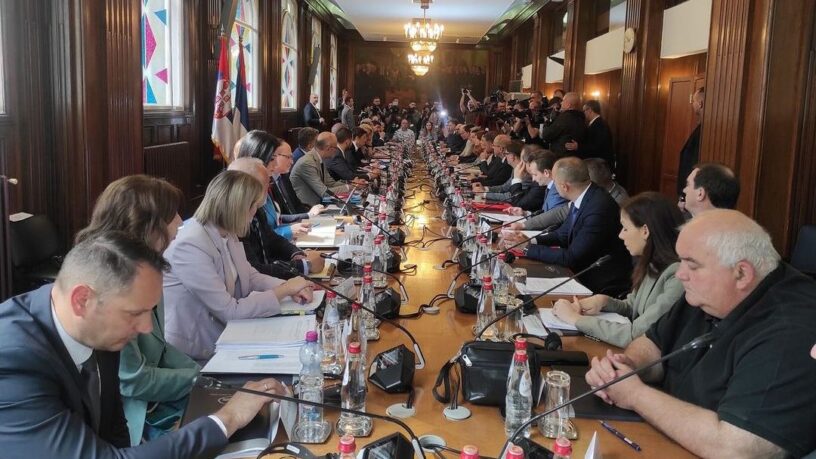Government and opposition representatives again fail to agree on conditions for holding repeat Belgrade and local elections.
A new meeting between Serbia’s ruling MPs and part of the opposition on Thursday failed after the opposition left the meeting after two hours and no agreement was reached on election conditions. The opposition gathered around the Serbia Against Violence list participated in the meeting, while the NADA coalition refused to participate.
Although the opposition has not officially announced a joint decision to boycott the next Belgrade and local elections, opposition leaders have said they “do not want to participate in [election] theft” and that the “real opposition will not participate in repeat elections”.
The Speaker of the National Assembly, Ana Brnabic, said the government was working to meet the recommendations made by the OSCE’s Office for Democratic Institutions and Human Rights, ODIHR, after last December’s elections.
“Today, I raised an exceptionally specific topic, namely the amendments and additions to five election laws, which … when we have done, we will have fully implemented seven ODIHR recommendations,” she said.
“It was an attempt at dialogue, I know this is not what dialogue looks like, but that will not stop me from trying. I will continue to try and appeal that we behave as responsible and serious people,” Brnabic said.
She claimed that the opposition was not interested in the ODIHR recommendations, but only in a demand to hold repeat Belgrade and regular local elections on the same day.
Brnabic gave opposition parties and NGOs a deadline of noon Friday to propose their representatives for the commission that will deal with inspection, revision and control of the voter list and how they can “form that commission as soon as possible”.
The vice-president of the opposition Party of Freedom and Justice, Marinika Tepic, said the opposition position is that it is impossible to implement changes to the law in conditions when elections have already been announced, and when the ruling party has submitted the electoral list and is already conducting a campaign.
“We cannot participate in the implementation of the ODIHR recommendations until the elections are postponed. First, all the recommendations should be implemented and only then should elections be announced,” she said.
A previous parliamentary collegium, held on April 3, convened by Brnabic, also ended without agreement. On the same day, Brnabic announced new elections in Belgrade for June 2.
Biljana Djordjevic, MP of the opposition Green-Left Front, said the format of future talks should be considered. “It’s not a question of whether we will fight for free and fair elections, it’s just a question of whether it’s this format,” said Djordjevic.
She added that the latest meeting showed that there are numerous key recommendations on the election process that the government has not fulfilled in 12 years.
Apart from representatives of part of the opposition and the government, the meeting was also attended by NGOs that monitor elections, CESID and Transparency Serbia, US Ambassador Christopher Hill and the head of the European Union delegation in Serbia, Emanuele Gioffre.
Hill said after the meeting that the US is observing implementation of the ODIHR recommendations and that talks should continue. “These dialogues are very important and dialogue should be continued,” Hill said and added that today’s dialogue was conducted in a “positive tone”, but that big political issues remain.
On April 3, an agreement foundered because the ruling Progressive Party did not accept the opposition’s demand that fresh Belgrade elections be held on the same day as regular local elections in around 60 local municipalities. Opposition MPs said holding elections on the same day was needed to prevent organised voter “migration”.
Holding all elections on the same day was one of three requests that the opposition set to the government. The Progressive Party accepted two other requests from the opposition – the formation of a commission to control and audit the voter list and to discuss media reporting, primarily that of the public broadcasting service.
The OSCE report on Serbia’s December 2023 elections said Serbia needs to initiate legislative amendments well in advance of the next elections, address concerns about voter lists, increase public confidence, prevent intimidation and pressure on voters – and provide for a clear separation between official functions and campaigning.
The report also noted allegations of the organised “migration of voters” – bussing –, vote buying and domination of the campaign by President Aleksandar Vucic and his Progressive Party.
The European Parliament on February 8 adopted a resolution on the Serbian elections and called for an international investigation and deployment of an EU expert mission into alleged fraud.
The resolution called for “an independent international investigation by respected international legal experts and institutions into the irregularities of the parliamentary, provincial and municipal elections, with special attention to the elections to the Belgrade City Assembly, as certain allegations, including those regarding organised voter migration at local level, go beyond the scope covered by the OSCE/ODIHR reports”.



